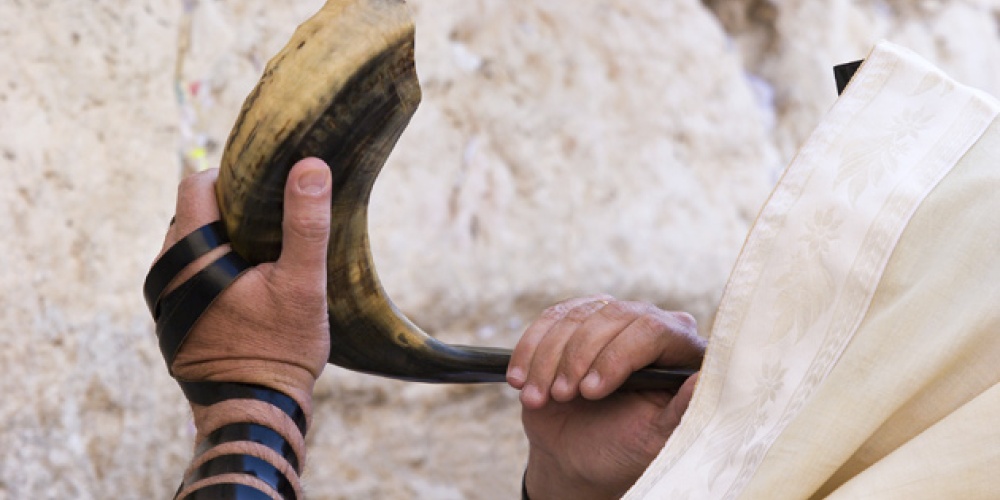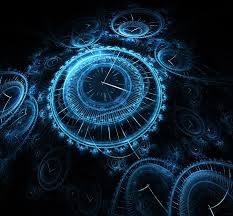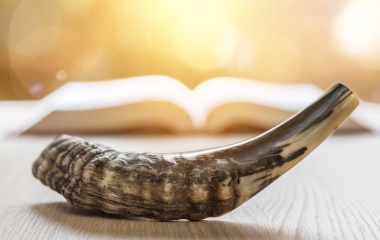
"Blow the shofar at the [beginning] of the month, when the day of our holiday is covered". Rosh Hashanah is the only one of our holidays celebrated on the first of the month, and thus, unlike other holidays where the moon is clearly visible, on Rosh Hashanah the moon is almost completely concealed.
This concealment reflects the fact that Rosh Chodesh, the beginning of the new month, is effectively ignored, taking a back seat to the much greater focus on the beginning of the year. In reality, not only is Rosh Chodesh hidden, so is much of Rosh Hashanah--at least, from a biblical perspective. Unique amongst our holidays, Rosh Hashanah is mentioned only twice in the Torah; even more striking is that there is no context to this holiday. No historical event or even agricultural motif is mentioned in connection to Rosh Hashanah. Simply put, we have no idea why there is a holiday "on the first day of the seventh month".
And the little the Torah does say appears contradictory. In parshat Emor, we are told, "on the seventh month on the first day you shall have a day of rest, a day to remember the blowing, zichron teruah, a holy calling" (Vayikra 23:24). In parshat Pinchas, we are told that it's a yom teruah, a day of blowing. Which is it? A day to blow or a day to remember blowing?
If the latter, we would need to determine to which blowing the Torah refers. Presumably it would be the only actual blowing of the shofar mentioned in the Torah, the shofar that sounded at Sinai: "and the sound of the shofar went and grew stronger; Moshe would speak and G-d would answer with a [loud] voice" (Shemot 19:19). This assumes that it is the shofar we are blowing, something the Torah does not actually mention in connection with Rosh Hashanah.
Perhaps it's the hazozrot, the trumpets, we are to blow (or remember); the first day of the seventh month qualifies as one of "our days of joy, our holidays and our new moons" (Bamidbar 10:10).
One might suggest that that with so many holidays during the seventh month, the blowing on the first day of the month is specifically mentioned because this blowing heralds this most important of months. And yet we all know that the blowing refers to the shofar, the integral mitzva of Rosh Hashanah. Why this veil of biblical secrecy?
The Talmud quotes a view that, indeed, yom teruah and zichron teruah are contradictory. The former refers to years when Rosh Hashanah falls during a weekday, and the latter to those years when it falls on Shabbat; hence, the biblical source that we do not blow shofar when Rosh Hashanah falls on Shabbat. Yet this view is rejected by the Talmud Bavli (Rosh Hashanah 29b). Zichron is understood as an adjective describing the nature of teruah. We blow shofar so that memory should be awakened.
In biblical Hebrew the term zachor, to remember, also means "to mention". "Zachor (remember) the Shabbat" thus becomes the source of the obligation to say kiddush. Rashi (Vayikra 23:24) notes that zichron teruah is the biblical source for mention of the verses of Malchiot, Zichronot, and Shofarot. Combined with the literal meaning, to remember, we beseech G-d to remember our own merits and those of the Jewish people. Maimonides understood the shofar as a wake-up call to repentance (Hilchot Teshuva 3:4), leading us to improve our ways; thus, the shofar not only reminds G-d of our merit, but also reminds us to live up to our potential.
Rosh Hashanah marks the beginning of the aseret yemi teshuva, the ten days of repentance. Each person has their own unique set of circumstances, misdeeds, and areas for improvement. The Torah tells us to make sounds and to remember. What we do with those sounds and how we remember is up to us.
While each person may find slightly different meanings in the observance of the Yamim Tovim, Pesach, Yom Kippur, Sukkot and Shavuot are celebrated in the same manner the world over. Matza, lulav, sukkah, fasting, even dancing are the common denominators uniting all Jews. But Rosh Hashanah is celebrated in the heart and mind of each individual, in our internal resolve to improve. We must personalize the holiday, and hence, the Torah can say very little about its observance. Rosh Hashanah is not even a uniquely Jewish holiday. References to the world as whole abound. After all, Rosh Hashanah commemorates the creation of the man, not the founding of the Jewish people.
Even prayer, which plays such a vital role on Rosh Hashanah is defined as "worship of the heart" (Taanit 2a). The words may be the same for all but how it impacts on us varies from person to person.
The blessing we make on the shofar is "lishmoah (to hear) the sound of shofar". One person may blow the shofar for all, but each person hears its sounds differently. Some only hear a kol demmah daka (a thin faint sound), whereas others merit hearing a shofar gadol, a great blast. May we merit hearing the shofar of redemption -- perhaps if we listen carefully enough, we can make it a reality.



